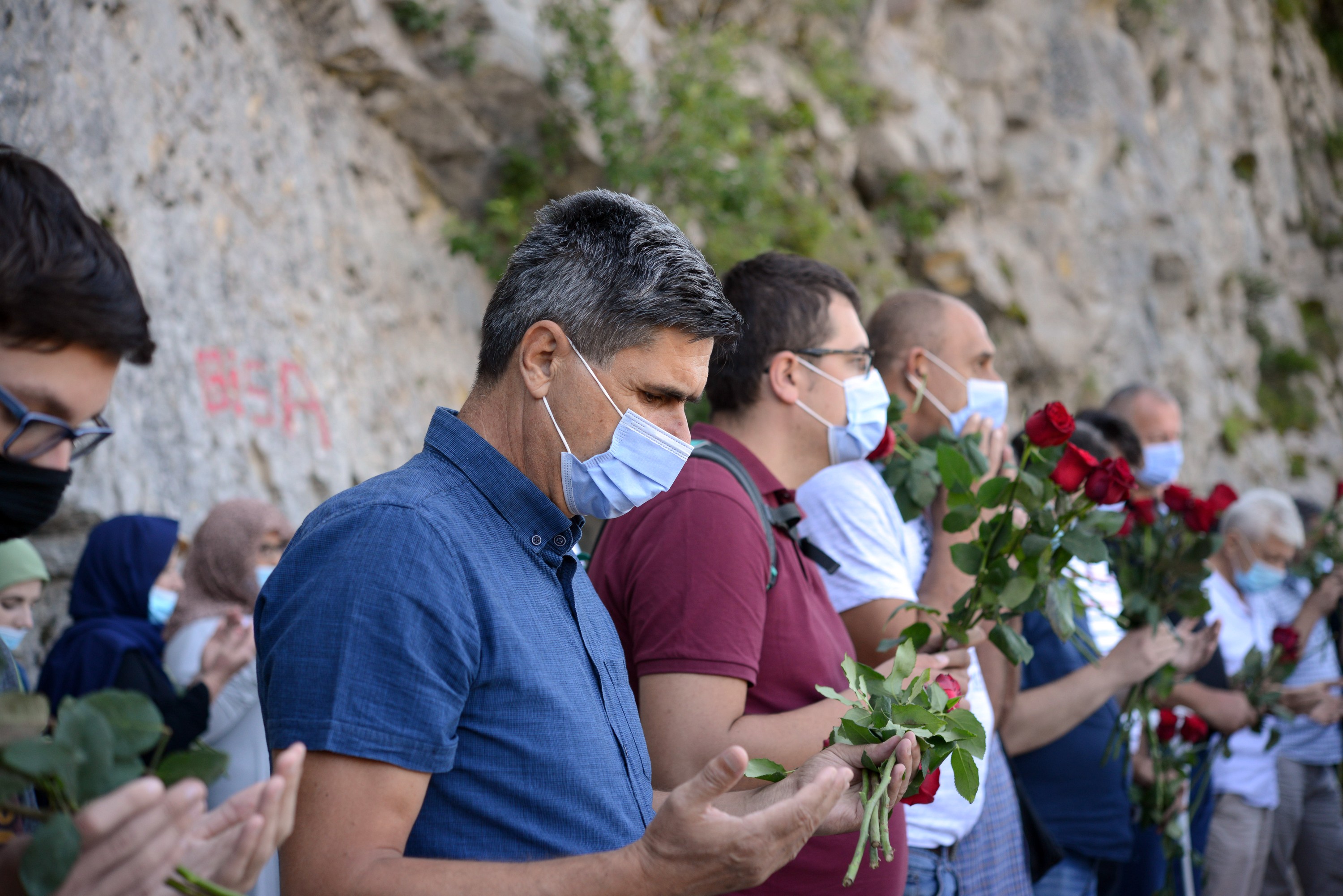War veterans of the Army of the Republic of Bosnia and Herzegovina (ARBiH), the Croat Defence Council (HVO) and the Army of Republika Srpska (VRS) paid their respects today to the people of Prijedor killed at Korićanske stijene, a site located in the Kneževo/Skender Vakuf Municipality.
Organised by the Centre for Nonviolent Action Sarajevo-Belgrade, war veterans of ARBiH, HVO and VRS honoured the 200 civilians killed at Korićanske stijene.

On 21 August 1992, several hundred Bosniak and Croat civilians left the Trnopolje Camp near Prijedor on an organised convoy over Mount Vlašić towards Travnik. Some of the prisoners were brought to Trnopolje from the Keraterm and Omarska camps after the Serb authorities decided to shut down these camps. The convoy of buses and lorries was escorted by officers of the Prijedor police intervention unit. The buses set off from the settlement of Tukovi and from in front of the Trnopolje Camp and converged into a single convoy in Kozarac. They were ordered to stop by the Ugar river on Mount Vlašić where, according to the indictment, more than 150 men were taken off the convoy and shot, while 12 survived the execution at the edge of a 200 meter cliff. Apart from victims from Prijedor, the remains of a number of civilians from Kotor-Varoš were also found at this site. Eleven members of the Prijedor police intervention unit were convicted for the crime at Korićanske stijene.
“In July, we attended the commemorations to those killed in Briševo and Zecovi with a mixed group of war veterans, and we had also visited the Trnopolje Camp earlier. Korićanske stijene are one of the sites of mass killings of non-Serbs from Prijedor and by coming here, we want to once again honour the victims and point out the importance of prosecuting those responsible for the crimes and finding the remains of victims. As war veterans, we feel a sense of responsibility and duty to honour all victims and their families and point out the importance of preserving the memory of victims of these crimes. Once again, we witness that this site is an unmarked site of suffering and we call on the authorities to allow the victims’ families to mark this place,” said Amer Delić, a member of the Centre for Nonviolent Action and a war veteran of ARBiH from Zavidovići.

Munevera Avdić, president of the Organisation of Families of Shahids, Fallen Fighters and Missing Persons from Kotor-Varoš, a co-organiser of the commemoration together with the Regional Prison Camp Survivors Association from Banja Luka, reminded those present that Bosniaks and Croats from Kotor-Varoš were also killed at this site.
“To date, we have confirmation that five persons from Kotor-Varoš were found here, three Bosniaks and two Croats, but there is still work to be done on finding the missing… We don’t know whether they were killed somewhere else and then brought here or whether they were killed at this site. Our duty is to come here for as long as we live and to transfer this duty of memory to future generations. I see the attendance of war veterans as a process showing the workings of conscience in many people, when people come to hear, to see, it spreads,” Avdić said.
Đoko Pupčević, a war veteran from Šamac, said it was important to come to sites like this one and honour the victims.
“It’s important to see sites of suffering of all nationalities, to lay flowers at this site where innocent civilians were killed just for being of a different religion, civilians who had been in camps… After being in camps, when they were on their way to a prisoner exchange, there must have been hope and joy among them, but instead they ended up in this 200-meter-deep abyss. It is difficult to look into this here precipice, let alone fall into it. It is a great shame that not all those responsible for crimes have been prosecuted, these people who committed the crimes should turn themselves in and serve their sentences,” said Đoko Pupčević, a veteran of the Army of Republika Srpska.

Under the organisation of the Centre for Nonviolent Action, veterans from the region have attended commemorations in BiH in Gornji Vakuf, at Site 715 near Zavidovići, in Stog near Vozuća, in Novi Grad/Bosanski Novi, Sanski Most (Hrastova glavica), Sijekovac near Brod, Laništa near Brčko, Trusina near Konjic, Ahmići near Vitez, Grabovica near Mostar, Skelani near Srebrenica, Briševo and Zecovi near Prijedor, Stupni Do near Vareš, and in Serbia in Grdelička klisura near Leskovac, Varvarin near Kruševac, Aleksinac, as well as in Croatia in Pakrac, Varivode and Gošić near Knin.
“Unfortunately, there have been many killings and crimes, but this is something that touched me in particular because these were innocent civilians who were killed in very difficult times. I feel Prijedor is a special place because, second to Srebrenica, so many innocent civilians suffered here, they were robbed, imprisoned, killed… We come here as people wanting to honour all victims, especially civilians, and that seems like an important step forward,” said Ivo Anđelović, a war veteran of the Croat Defence Council from Brčko.
The photo gallery is available HERE
Media reports:
Beta.rs
Kosova.info